
INTERNATIONAL REVIEW OF HYDROBIOLOGY
metrics 2024
Unlocking the Secrets of Aquatic Life and Behavior
Introduction
INTERNATIONAL REVIEW OF HYDROBIOLOGY is a prestigious academic journal dedicated to the dynamic fields of Aquatic Science and Ecology, Evolution, Behavior, and Systematics. Published by a reputable German publisher, this open-access journal ensures that groundbreaking research is readily available to a global audience, fostering collaboration and innovation within the scientific community. With an impressive impact factor and classification within the Q2 category of both Aquatic Science and Ecology, it ranks notably high on Scopus, standing at 211 out of 721 in Ecology and 84 out of 247 in Aquatic Science as of 2023. Covering a broad scope from fundamental hydrobiological research to applied ecological studies, the journal plays a crucial role in advancing knowledge and addressing contemporary environmental challenges. Researchers, professionals, and students will find INTERNATIONAL REVIEW OF HYDROBIOLOGY to be an essential resource for informing their own work and contributing to the global dialogue on aquatic systems and their conservation.
Metrics 2024
 0.45
0.45 -
- -
- 58
58Metrics History
Rank 2024
Scopus
JCI (Web Of Science)
Quartile History
Similar Journals

Water Biology and Security
Uniting research to safeguard our aquatic environments.Water Biology and Security, published by KEAI PUBLISHING LTD, is a pivotal open-access journal that has been addressing critical issues in the interdisciplinary fields of water sciences, aquatic biology, and environmental sustainability since its inception in 2022. With an E-ISSN of 2772-7351 and a distinguished ranking within the top quartile (Q1) of several categories including Agricultural and Biological Sciences, Animal Science and Zoology, Aquatic Science, and Water Science and Technology, the journal stands out as a leading platform for innovative research. Based in Beijing, China, and supported by an impressive impact factor derived from its Scopus rankings, the journal aims to disseminate high-quality and impactful research that addresses the challenges related to water resources and ecosystems. Its open-access format enhances accessibility, ensuring that vital information reaches policymakers, practitioners, and scholars worldwide. As we converge through 2024, the journal aspires to foster a vibrant scholarly community, facilitating dialogues that inform practice and advance the scientific understanding of aquatic environments.
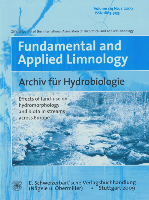
Fundamental and Applied Limnology
Unveiling Aquatic Mysteries: A Platform for Freshwater ScholarshipFundamental and Applied Limnology is an esteemed academic journal dedicated to the exploration of freshwater ecosystems, bridging the gap between fundamental research and practical applications. Published by E Schweizerbart'sche Verlagsbuchhandlung in Germany, this journal has been a vital resource in the fields of aquatic science and ecology since its inception in 2007. With its ISSN 1863-9135 and E-ISSN 1863-9135, it provides a platform for researchers to disseminate significant findings related to limnology, contributing to a rich understanding of freshwater biodiversity, water quality, and ecological interactions. Although currently rated in the Q3 quartile for aquatic sciences and ecology as per the 2023 rankings, it remains a valuable outlet for interdisciplinary research and practical insights, facilitating critical advancements in environmental management. Open access options enhance its visibility and accessibility, making it indispensable for researchers, professionals, and students alike who are committed to advancing the scholarship in freshwater studies. Engaging with this journal not only opens doors to the latest research findings but also fosters collaboration and innovation in the ecological community.
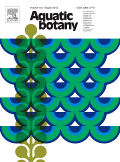
AQUATIC BOTANY
Unveiling the complexities of aquatic plant life.Aquatic Botany, published by Elsevier, stands as an influential scholarly journal in the fields of Aquatic Science and Plant Science. Established in 1975, this esteemed journal has maintained a strong commitment to advancing our understanding of aquatic plant life, providing a platform for high-quality research that contributes to both ecological awareness and the sustainable management of aquatic ecosystems. With its impact factor reflecting a commendable ranking in the Scopus database—#169 in Plant Science and #95 in Aquatic Science—it is recognized for its valuable contributions to the scientific community, evidenced by its Q2 quartile ranking in both categories as of 2023. The journal does not currently offer open access, ensuring rigorous review and scholarly integrity while being accessible through institutional subscriptions. Set against the backdrop of the Netherlands, Aquatic Botany continues to be a vital resource for researchers, professionals, and students looking to explore the complex interactions between aquatic flora and their environment, aiming to inspire innovative ideas and practical solutions for aquatic conservation and management.

Journal of Oceanology and Limnology
Diving Deep into Aquatic Science DiscoveriesJournal of Oceanology and Limnology, published by SCIENCE PRESS, is a premier academic journal dedicated to advancing the fields of oceanography and limnology. With an ISSN of 2096-5508 and E-ISSN 2523-3521, this journal has emerged as a vital resource since its inception, aiming to disseminate cutting-edge research and comprehensive studies on aquatic environments. Based in China and indexed with notable rankings in Scopus, including a Q2 category in Oceanography and a Q3 category in Water Science and Technology, this journal significantly contributes to knowledge in these crucial scientific disciplines. The H-index for the journal is currently being established, reflecting its evolving impact within the academic community. Moreover, the open access model promotes wider dissemination, ensuring that research findings are accessible to a global audience. Covering a diverse range of topics from ecosystem health to climate impact on water bodies, the Journal of Oceanology and Limnology aspires to foster interdisciplinary dialogue and innovation among researchers, professionals, and students engaged in understanding and preserving aquatic life.
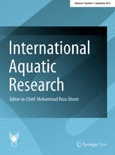
International Aquatic Research
Advancing aquatic knowledge for a sustainable future.International Aquatic Research, published by the Islamic Azad University, Tonekabon Branch, is a vital open-access journal dedicated to advancing the field of aquatic sciences since its inception in 2009. With an ISSN of 2008-4935 and an E-ISSN of 2008-6970, the journal plays a significant role in disseminating high-quality research findings from Iran and around the globe. It covers a broad range of topics in aquatic biology, fisheries science, and marine ecology, making it a valuable resource for researchers, professionals, and students alike. As of 2023, it ranks in the third quartile (Q3) of the aquatic science category with a Scopus rank of #138 out of 247 in Agricultural and Biological Sciences, reflecting its growing influence in the field. With a commitment to promoting scientific knowledge and fostering collaboration among aquatic research communities, International Aquatic Research is positioned as an essential platform for those dedicated to understanding and conserving marine and freshwater environments.
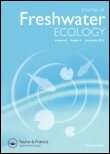
JOURNAL OF FRESHWATER ECOLOGY
Exploring the depths of aquatic science and ecology.JOURNAL OF FRESHWATER ECOLOGY, published by Taylor & Francis Inc, is an esteemed source of research dedicated to advancing the understanding of freshwater ecosystems. Established in 1981, this Open Access journal has provided a platform for innovative studies and groundbreaking articles relevant to the fields of Aquatic Science and Ecology. With its HIndex reflecting a commitment to quality scholarship, the journal is currently classified in the Q3 category for both Aquatic Science and Ecology, Evolution, Behavior and Systematics, indicating its respectable impact within these disciplines. The journal ranks within the 45th percentile in Ecology and the 41st percentile in Aquatic Science on Scopus, highlighting its relevance to a global audience of researchers and practitioners. By facilitating unrestricted access to research findings since 2017, JOURNAL OF FRESHWATER ECOLOGY aims to enrich our understanding of freshwater systems and their conservation, making it an essential resource for those invested in ecological research and environmental sustainability.

CANADIAN JOURNAL OF FISHERIES AND AQUATIC SCIENCES
Elevating standards in fisheries and aquatic research.The Canadian Journal of Fisheries and Aquatic Sciences, published by Canadian Science Publishing, stands as a premier interdisciplinary journal dedicated to advancing knowledge in the fields of aquatic sciences, ecology, and evolutionary biology. With a longstanding history of publication since 1980, this journal delivers high-quality, peer-reviewed research that contributes to the understanding of aquatic ecosystems and the sustainable management of fisheries. The journal is esteemed for its rigorous standards and currently holds a Q1 ranking in both Aquatic Science and Ecology, Evolution, Behavior, and Systematics as of 2023, evidencing its significant impact in these critical areas. Researchers, professionals, and students alike can expect compelling explorations of both fundamental and applied aspects of aquatic sciences. While the journal offers traditional access, it remains committed to disseminating pivotal research findings to foster a vibrant community of scholars and practitioners striving towards innovative solutions for aquatic environmental challenges.
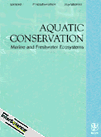
AQUATIC CONSERVATION-MARINE AND FRESHWATER ECOSYSTEMS
Illuminating pathways to protect our water worlds.AQUATIC CONSERVATION-MARINE AND FRESHWATER ECOSYSTEMS, published by WILEY, is a premier international journal dedicated to advancing the understanding of aquatic ecosystems and their conservation. With an impact factor reflecting its significant influence and a distinguished position in the Q1 quartile across key categories such as Aquatic Science, Ecology, and Nature and Landscape Conservation, this journal serves as an essential resource for researchers and professionals engaged in the study and protection of marine and freshwater environments. Covering a broad array of topics, from ecosystem management to conservation strategies, the journal encourages the dissemination of innovative research and interdisciplinary perspectives. Although it is not an open-access publication, this journal is esteemed for its rigorous peer-review process, facilitating a platform where vital research influences policy and practice in the aquatic sciences. Established in 1991, AQUATIC CONSERVATION continues to be a cornerstone in the academic exploration and safeguarding of aquatic ecosystems through to its converged years of 2024 and beyond, providing a critical lens for the future of environmental sustainability.
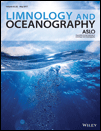
LIMNOLOGY AND OCEANOGRAPHY
Charting New Waters in Aquatic ResearchLimnology and Oceanography is a premier peer-reviewed journal published by Wiley that has been at the forefront of aquatic sciences since its inception in 1956. With an impressive impact factor placing it in Q1 in both Aquatic Science and Oceanography categories, this journal showcases cutting-edge research and studies relevant to the dynamics of freshwater and marine ecosystems. Limnology and Oceanography serves as a vital platform for researchers, professionals, and students to disseminate their findings and foster a deeper understanding of aquatic environments. The journal does not currently offer open access, but it provides a unique opportunity for scholars to contribute to a body of work that influences policy, conservation efforts, and the scientific community at large. With its substantial ranking in Scopus as #12 in Aquatic Science and #9 in Oceanography, Limnology and Oceanography remains a critical resource for advancing knowledge in these vital fields.
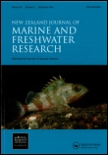
NEW ZEALAND JOURNAL OF MARINE AND FRESHWATER RESEARCH
Innovating Research for Sustainable Water ManagementNEW ZEALAND JOURNAL OF MARINE AND FRESHWATER RESEARCH, published by Taylor & Francis Ltd, stands as a distinguished platform for the dissemination of innovative research in the realms of aquatic science and ecology. With an ISSN of 0028-8330 and E-ISSN 1175-8805, this journal has been curating significant scientific contributions since its inception in 1967, continuing through to 2024. Recognized in the Q2 category across multiple relevant fields—including Aquatic Science, Ecology, and Water Science—this journal ranks notably in Scopus, with a 74th percentile for Ecology, Evolution, Behavior and Systematics, highlighting its impact and relevance within the scientific community. Though not an open-access publication, its rigorous peer-reviewed articles offer insights that resonate with researchers, professionals, and students who are passionate about advancing our understanding of freshwater and marine ecosystems. By fostering a collaborative space for ecological and environmental inquiries, the NEW ZEALAND JOURNAL OF MARINE AND FRESHWATER RESEARCH is essential for those aiming to contribute to the vital conversations around biodiversity, conservation, and sustainable management of aquatic resources.